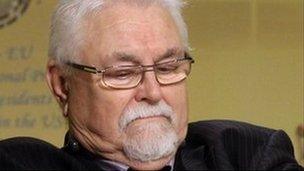Party leaders should choose their enemies carefully
- Published
- comments

Lord Maginnis quit the Ulster Unionist Party following a disagreement with party leader Mike Nesbitt
"Choose your enemies carefully, because they will define you".
I'm not sure if that's a traditional proverb, or just a line from U2's "Cedars of Lebanon".
Either way, it is often argued that in politics a new leader needs to define him or herself not just by what they are for, but, more importantly, what they are against.
In this tradition we saw the former Labour leader Neil Kinnock very publicly turning on the Militant Tendency's Derek Hatton.
Then his successor, Tony Blair, replaced the old Labour party's Clause IV commitment to the "common ownership of the means of production" with his own vision of social democracy.
Since then it has become shorthand to talk about new leaders' "Clause IV moments".
It is possible to view Mike Nesbitt's rift with the former Fermanagh South Tyrone MP Lord Maginnis in this light.
For all his long service to the party, in recent years the peer seemed increasingly difficult to manage, whilst his tendency to shoot from the hip whilst on the airwaves caused consternation to the hapless Ulster Unionist press office.
Only crime
So perhaps Mr Nesbitt is breathing a sigh of relief, as Lord Maginnis's decision to leave the Ulster Unionists after more than 50 years means he and his officials will no longer have to respond to controversial comments on homosexuality, likening it to either bestiality or paedophilia.
However, as a Clause IV moment this leaves something to be desired.
Far from seizing the opportunity to manoeuvre his party into a more liberal position on moral issues, Mr Nesbitt has made it clear that Lord Maginnis's only crime was to ignore the instruction to clear his broadcasts with the UUP press office.
Indeed as late as Tuesday morning, the day Lord Maginnis quit the Ulster Unionists, the leader seemed to be offering to restore his position within the party with no questions asked.
In common with Tom Elliott's spat with the Strangford MLA David McNarry, the UUP disciplined Lord Maginnis, not because of the substance of his comments, but because the politician shared his views with the media.
Whilst a disciplined press policy might be important to political success, this "not in front of the children" approach isn't going to inspire any voters to think again about choosing the UUP.
When Tony Blair chose his Clause IV enemies he was riding a tide of support which swept Labour to power.
By contrast, Mike Nesbitt appears to be having difficulty articulating policies which might appeal to unionists disenchanted with the dominant DUP.
The danger is that any floating voters might interpret this latest falling out between the leader and the Grand Old Man of Fermanagh unionism simply as evidence that the division and demise of the Ulster Unionists is now irretrievable.